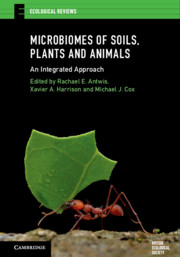Book contents
- Microbiomes of Soils, Plants and Animals
- Ecological Reviews
- Microbiomes of Soils, Plants and Animals
- Copyright page
- Contents
- Contributors
- Preface
- Abbreviations
- Chapter One Microbiomes of soils, plants and animals: an introduction
- Chapter Two Analytical approaches for microbiome research
- Chapter Three Microbiomes of soils
- Chapter Four Factors that shape the host microbiome
- Chapter Five Microbial symbioses and host nutrition
- Chapter Six The microbiome and host behaviour
- Chapter Seven Host microbiomes and disease
- Chapter Eight Adapting to environmental change
- Chapter Nine Microbial biotechnology
- Chapter Ten Synthesis and future directions
- Index
- Plate Section (PDF Only)
- References
Chapter Two - Analytical approaches for microbiome research
Published online by Cambridge University Press: 07 March 2020
- Microbiomes of Soils, Plants and Animals
- Ecological Reviews
- Microbiomes of Soils, Plants and Animals
- Copyright page
- Contents
- Contributors
- Preface
- Abbreviations
- Chapter One Microbiomes of soils, plants and animals: an introduction
- Chapter Two Analytical approaches for microbiome research
- Chapter Three Microbiomes of soils
- Chapter Four Factors that shape the host microbiome
- Chapter Five Microbial symbioses and host nutrition
- Chapter Six The microbiome and host behaviour
- Chapter Seven Host microbiomes and disease
- Chapter Eight Adapting to environmental change
- Chapter Nine Microbial biotechnology
- Chapter Ten Synthesis and future directions
- Index
- Plate Section (PDF Only)
- References
Summary
Two major outstanding questions in microbiome research ask what microbes are present in a community and how they interact with each other and their hosts. Recent, rapid improvements in nucleic acid (DNA and RNA) sequencing allow us to study the composition and function of microbiomes in unprecedented detail, leading to a step change in our understanding of host–microbe interactions. This chapter gives a broad overview of the basic toolkit available to modern microbiologists and microbial ecologists, exploring their application to key questions about microbiome structure and function. We cover tools based on nucleic acid sequencing (e.g. amplicon sequencing, metagenomics, metatranscriptomics) as well as approaches targeting larger molecules such as metabolomics and proteomics. We discuss the use of microbial culture as a means of measuring functional capacity of individual microbes, or building artificial communities to understand emergent properties of consortia. We emphasise the advantages of combining multiple techniques alongside robust experimental design to garner powerful quantitative estimates of microbiome structure, and how this relates to host–microbe interactions.
Keywords
- Type
- Chapter
- Information
- Microbiomes of Soils, Plants and AnimalsAn Integrated Approach, pp. 8 - 28Publisher: Cambridge University PressPrint publication year: 2020
References
- 3
- Cited by

